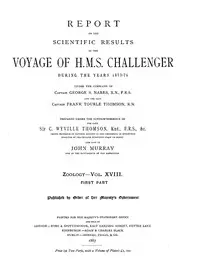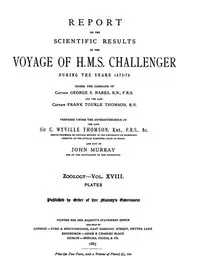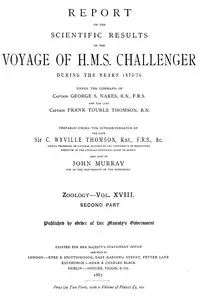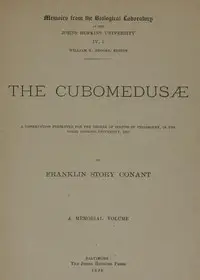"Report on the Radiolaria Collected by H.M.S. Challenger During the Years 1873-1876" by Ernst Haeckel is a scientific exploration that presents an in-depth study of Radiolaria discovered during the H.M.S. Challenger expedition. The book meticulously catalogues the physical forms, groupings, and environmental importance of these tiny sea creatures. Haeckel reflects on his decade-long commitment to understanding the enormous diversity of Radiolaria, explaining the methods used to gather and study specimens from great ocean depths, stressing how important Radiolaria are to understanding life in the ocean. He shares his original goals and the problems he handled. The book shows a detailed look at over 4,300 species, emphasizing the vast diversity within Radiolaria. In addition, the report highlights the important connection between the lifecycles of the organisms and their environments.

Report on the Radiolaria Collected by H.M.S. Challenger During the Years 1873-1876, First Part: Porulosa (Spumellaria and Acantharia) Report on the Scientific Results of the Voyage of H.M.S. Challenger During the Years 1873-76, Vol. XVIII
By Ernst Haeckel
Venture into the depths of the 19th-century ocean to uncover a hidden universe of microscopic life, where a scientist painstakingly reveals the beauty and complexity of thousands of Radiolarian species.
Summary
About the AuthorErnst Heinrich Philipp August Haeckel was a German zoologist, naturalist, eugenicist, philosopher, physician, professor, marine biologist and artist. He discovered, described and named thousands of new species, mapped a genealogical tree relating all life forms and coined many terms in biology, including ecology, phylum, phylogeny, and Protista. Haeckel promoted and popularised Charles Darwin's work in Germany and developed the influential but no longer widely held recapitulation theory claiming that an individual organism's biological development, or ontogeny, parallels and summarises its species' evolutionary development, or phylogeny.
Ernst Heinrich Philipp August Haeckel was a German zoologist, naturalist, eugenicist, philosopher, physician, professor, marine biologist and artist. He discovered, described and named thousands of new species, mapped a genealogical tree relating all life forms and coined many terms in biology, including ecology, phylum, phylogeny, and Protista. Haeckel promoted and popularised Charles Darwin's work in Germany and developed the influential but no longer widely held recapitulation theory claiming that an individual organism's biological development, or ontogeny, parallels and summarises its species' evolutionary development, or phylogeny.





![The zoology of the voyage of H.M.S. Beagle [vol. 2 of 5] : $b Mammalia by G. R. (George Robert) Waterhouse](https://cdn.a2-host.cloud/zukBAv5nl0bloqaLpMGgOWFRjqdaX4OAVNpYK78XfHc/rs:fill:215:325:0/g:ce/aHR0cHM6Ly9zcC1hc3NldHMuczMudXMtd2VzdC0wMDQuYmFja2JsYXplYjIuY29tL2Jvb2svNjk1NzcvVGhlX3pvb2xvZ3lfb2ZfdGhlX3ZveWFnZV9vZl9ITVNfQmVhZ2xlX3ZvbF8yX29mXzVfYl9NYW1tYWxpYV9jb3Zlci5qcGc.webp)












